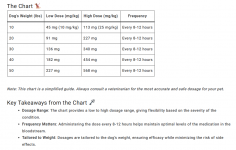Chestle
Well-known member
Just had the annual checkups for the Labs. 2 out of 3 showed giardia in the fecal test. (new send-it-out-to-a-laboratory fecal test is $56 now!) So the vet prescribes ~ $160 in meds for each dog.
Now a little history. I've had Labs since '81. Always got checkups, always had fecal tests done. Until vets started sending fecal tests out to laboratory, they did fecal flotation test with salt. Poop sank, parasite eggs floated to the top. Giardia are microscopic protozoan parasites; the flotation tests didn't show them. So for 40+ years I never had a vet tell me the fecal test showed giardia.
Giardia are everywhere in the environment. It's almost unavoidable. "Giardia parasites can be transmitted by eating or sniffing the cysts from contaminated surfaces like grass at the park, or by drinking contaminated water. Since dogs explore the world around them by putting things in their mouths, there are plenty of ways your dog can pick up the parasite in their environment, whether it is by chewing on a stick, eating (or just sniffing) poop, or drinking from a puddle."
So odds are that over the last 40+ years some or all of my dogs had Giardia. So what to do?
 www.vet.cornell.edu
www.vet.cornell.edu
Cornell Vet school says: "The goal of treatment is to resolve diarrhea and other clinical signs. Dogs without symptoms may not require treatment. "
That's exactly what I have done. If a dog IS symptomatic (acute or sudden diarrhea, soft/watery stool with mucus and a foul odor or abdominal discomfort) it was off to the vet and the treatment was usually metronidazole for a week or 10 days.
Which is pretty much still the treatment for giardia. Sometimes they will dose with both metronidazole and Fenbendazole (Panacur).
If you work your dog outside, it will probably pick up giardia.
In my case, I could treat my dogs right now to the tune of about $500 since they say even the dog with the negative test may have it as the tests are not 100%. I could complete the regimen, clean the whole house as they say, wash everything the dogs sit on and bathe the dogs after completing meds. Then I could take them out for a run and some dummy work and they'd pick up some giardia cysts on the first trip outside.
I think I'm going with Cornell. If they show symptoms, I'll treat them.
Your thoughts?
Now a little history. I've had Labs since '81. Always got checkups, always had fecal tests done. Until vets started sending fecal tests out to laboratory, they did fecal flotation test with salt. Poop sank, parasite eggs floated to the top. Giardia are microscopic protozoan parasites; the flotation tests didn't show them. So for 40+ years I never had a vet tell me the fecal test showed giardia.
Giardia are everywhere in the environment. It's almost unavoidable. "Giardia parasites can be transmitted by eating or sniffing the cysts from contaminated surfaces like grass at the park, or by drinking contaminated water. Since dogs explore the world around them by putting things in their mouths, there are plenty of ways your dog can pick up the parasite in their environment, whether it is by chewing on a stick, eating (or just sniffing) poop, or drinking from a puddle."
So odds are that over the last 40+ years some or all of my dogs had Giardia. So what to do?
Giardia: Infection, treatment and prevention
Overview Giardiasis is a common parasitic infection that can cause diarrhea in dogs. It is caused by an intestinal parasite called Giardia, which can be found in feces-contaminated soil, food and water.
Cornell Vet school says: "The goal of treatment is to resolve diarrhea and other clinical signs. Dogs without symptoms may not require treatment. "
That's exactly what I have done. If a dog IS symptomatic (acute or sudden diarrhea, soft/watery stool with mucus and a foul odor or abdominal discomfort) it was off to the vet and the treatment was usually metronidazole for a week or 10 days.
Which is pretty much still the treatment for giardia. Sometimes they will dose with both metronidazole and Fenbendazole (Panacur).
If you work your dog outside, it will probably pick up giardia.
In my case, I could treat my dogs right now to the tune of about $500 since they say even the dog with the negative test may have it as the tests are not 100%. I could complete the regimen, clean the whole house as they say, wash everything the dogs sit on and bathe the dogs after completing meds. Then I could take them out for a run and some dummy work and they'd pick up some giardia cysts on the first trip outside.
I think I'm going with Cornell. If they show symptoms, I'll treat them.
Your thoughts?

